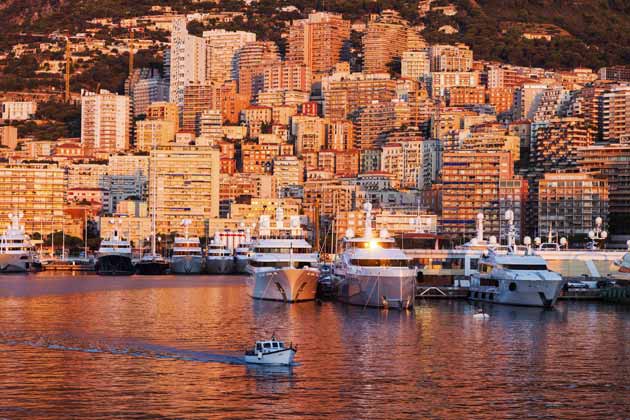Guide to expat life in Monaco

Monaco – the fairy-tale-like microstate on the French Riviera may be a dream destination for many expats, however only few privileged persons can call Monaco their home. Proportionally, it has a higher percentage of expats than any other country in the world – out of its current 38,000 inhabitants, only 20% are native Monégasques.
Monaco is often associated with ostentatious lifestyle, expensive yachts, fast cars and, of course, gambling. This is a superficial view from a tourist’s perspective – there is much more to the tiny city-state than meets the eye. If you asked a permanent resident, he’d probably mention low crime rates and high standard of living as the most important advantages of living in Monaco.
The level of security in Monaco cannot be matched by any other European country. Although you don’t normally see them, security cameras are everywhere, and there is nowhere to hide from the keen eye of the Monégasque police, not even on the narrow streets of Monaco Ville – the oldest part of the Principality.
Becoming a resident
Although Monaco is not part of the Schengen agreement, because of a special treaty between Monaco and France, you can enter with a Schengen visa. The process will be more difficult for people based outside the EU. In any case, expect a lot of scrutiny during the process of residence application – on an upside – this is why Monaco is such a safe place to live.
The Directorate of Public Security check everyone’s personal history and people with criminal past are not allowed to remain in the Principality. You will have to submit a certificate of good conduct proving that you don’t have any criminal records in any of the countries you used to be a resident of prior to coming to Monaco. Of course, all documentation is in French hence any documents not in French will have to be translated by a qualified translator. This is not a big problem and your best port of call is an estate agent, who will have an array of add-on services on offer.
There’s a good reason for it because in order to remain a resident of Monaco you will be required to obtain a long-term lease or a freehold deed on a Monaco property. In addition, you need to prove you’re a person of independent means with at least EUR 300,000 deposited in a Monaco bank.
Finding the right place to live in Monaco
Although the whole of Monaco is approximately the size of Regent’s Park, there are a few distinct parts that differ from each other by facilities, the general feel and, of course, property prices. The Principality is divided into 10 quarters.
The old town Monaco Ville, also called Le Rocher (the rocki) is a noisy place with narrow streets and parking problems worse than what you’ve used to in London. Generally, it is avoided by Monaco’s residents, especially during the height of the tourist season. If you’re looking for exclusive lifestyle, you will probably find yourself frequenting Monte Carlo, La Condamine and Larvotto where property prices vary between EUR 30,000 and 100,000 per square metre.
Although it may sound strange, even a posh place like Monaco has “suburban” areas with cheaper property prices: Saint Michel, Moneghetti, La Colle and Les Revoires. Of course, that doesn’t mean these areas are plagued by crime and social depravation – they are as safe as the central parts of Monaco, only they don’t command as high a square meter price as areas with a higher entertainment value.
The discount you may expect for putting up with making a few more steps down to your favourite café is not a significant one – property prices in the “outskirts” are in the region of EUR 20,000 – 30,000 per square metre.
In fact, property is potentially one area that may disappoint the wannabe Monégasques. If you expect palatial apartments or a baronial castle, you’re in for a bit of a shock. There are very few villas or townhouses available and even if there are, the prices are astronomical. As for the apartments, despite the popular belief, many were built during the 1970s with the tourist industry in mind, which means tiny studio apartments with fairly average finish and problematic parking arrangements.
Tax haven
One of the biggest magnets for people wanting to move to Monaco is its status as a tax haven. Although it doesn’t have the negative connotation of places like Panama and others, Monaco doesn’t levy tax on income. It was abolished back in 1869. Wondering why? They don’t need the taxes. Monaco is one of the few places in the world that is not in debt. Its yearly revenue is higher than its outlays.
What is it like to live in Monaco
Although it may sound like a boring place for somebody accustomed to an active lifestyle, it is a lovely place to live. It has got a range of awesome bars and clubs, there are plenty of cultural events going on regularly, and the proximity of Nice (13 miles) and various clifftop hiking opportunities, there’s plenty to do and see for people who are too restless to spend the whole day promenading along the seaside.
If you are considering moving to Monaco, Cadogan Tate will assist you every step of the way – from your first enquiry to unpacking at your new home, we are here to help and advise you.
Information correct at time of publication.



